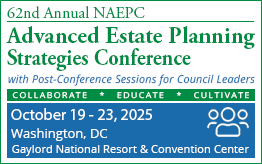February, 2016 Newsletter
Provided by Leimberg Information Services
See other issues.
PLR 201548004 Brings Belated Happiness with a Late Portability Election in the Spirit of the Breakfa
“No extension of time is available to make a late portability election if the estate tax return is required to be filed under the mandate of Code § 6018. PLR 201548004 provides the most recent example of the IRS granting relief to file a late portability election when the return is needed solely to make a portability election. As with many happy endings, avoidance of the drama and perhaps the expense of arriving at the climax would have saved a lot of stress in the first place. This newsletter reviews both the most recent PLR granting relief to file a late portability election as well as practical considerations with private letter ruling requests with portability elections. Better yet, skip the drama and urge your client to file a complete, properly prepared and timely filed estate tax return in the first place.”
Keith Schiller reviews PLR 201548004 where an extension of time was granted to file a portability election for an estate in which the estate tax return was not required under general filing requirements of Code § 6018.
Keith Schiller has authored a host of LISI newsletters respecting federal estate tax law and the preparation of the Form 706, among them:
· Estate Planning At The Movies®: Jeremiah Johnson Marks the Final Portability Regulations (Estate Planning Newsletter #2316). Discussion of final portability regulations with cross-references to four other LISI newsletters by this author on portability elections from strategy to compliance.
· Estate Planning At The Movies®: Ted 2 Inspires Analysis of Administrative Expense Deductions for Pre-Distribution Pet Care (Estate Planning Newsletter #2362).
· Estate Planning At The Movies®: Stepford Wives & IRC § 2053 Final Regulations. (Estate Planning Newsletter #1685). Review of final regulations governing the deductibility of debts and administrative expenses before payment and the implicit subjugation of the federal courts of appeal to the will of the regulatory authors.
Keith Schiller, Esq., shareholder of the Schiller Law Group, a PLC, of Alamo California, has more than 40 years of experience with taxation, and estate and business succession planning. Keith works with clients and consults on estate planning, tax compliance, business succession and trust administration. Keith is the author of the award-winning book, Estate Planning At The Movies® — Art of the Estate Tax Return (“706 Art”). The book reveals Keith’s best practice pointers, his insights from co-teaching with the IRS for greater than thirteen years, and practical recommendations from over a dozen leading practitioners across the country who contributed to the book. The Second Edition of 706 Art is published by Bloomberg, BNA Books and is available at http://www.bna.com/bnabooks/aetr. Keith is a member of the Advisory Board for Bloomberg BNA’s Estates, Gifts and Trusts Journal and the Consulting Board for the Leimberg Information Services, Inc. (“LISI”) Newsletter. He has taught 11 courses for the CalCPA Education Foundation and received the 2000 and 2010-2011 awards for Outstanding Course Materials. From passion, Keith chaired the Yosemite License Plate Campaign, during which he lobbied passage for the law approving the Yosemite License Plate and directed the state-wide marketing and sales campaign. The Yosemite License Plate has raised in excess of $35 million for the preservation of Yosemite and California conservation. Now Available: In addition to the Second Edition of Art of the Estate Tax Return the 2015 Supplement to the Second Edition is available through Bloomberg BNA (go tohttp://www.bna.com/bnabooks/aetr). Also, you can stay current on estate tax law by subscribing to the author’s Update Service for 2015 and 2016. To learn more and to subscribe, visit: http//shop.estateplanningatthemovies.com
Before we get to Keith’s commentary, members should note that a new 60 Second Planner by Bob Keebler was recently posted to the LISI homepage. In his commentary Bob reports on recent developments involving the proposed enactment of a state income tax by Alaska Governor Bill Walker, where the tax would apply to trusts governed by Alaska law. A draft of the legislation can be found at http://tinyurl.com/htfxfqv You don't need any special equipment - just click on this link to listen.
Now, here is Keith Schiller’s commentary:
EXECUTIVE SUMMARY:
Code § 2010(c)(5)(A) requires a timely filed estate tax return in order to make a portability election and Reg. §20.2010-2(a)(1) states that such return is a return required under Code § 6018(a). Code §6018(a) requires the filing of an estate tax return when the value of the gross estate plus adjusted taxable gifts exceed the basic exclusion amount in the year of death[i] in order to make a portability election. However, an extension of time to file a late portability election is available and may be granted within the discretion of the IRS under the private letter ruling protocols of Reg. §301.9100-3 if the estate tax return is not required to be filed under the general filing requirements of Code § 6018(a).
The first Revenue Procedure published annually sets forth the content requirements and user fee that must be paid with the ruling request. PLR 201548004 (along with PLRs 201406004, 201532002, 201536005, 201537010 and 201544001) reflect instances in which relief to file a late portability election have been granted by the IRS. Since the granting of relief is within IRS discretion and such relief may not be approved in a given situation, taxpayers and their return preparers will avoid a lot of stress and expense if the portability election is timely made on a complete and properly prepared return in the first place. This newsletter reviews the most recent favorable ruling and overviews the procedures and expense for obtaining relief to file a late portability election for an estate that is not required to file the Form 706 under the gross estate plus adjusted taxable gift value tests Code §6018(a).
The happy ending in PLR 201548004 and its earlier companions share some of the pain and stress in the course of the journey evidenced in The Breakfast Club.[ii] In this iconic teenage film for Generation X, the violation of a variety of school rules compels disconnected high school students to spend all-day Saturday in detention. The film ends in triumph with the erstwhile juvenile delinquent from an abusive home (portrayed by Judd Nelson) raising his hand in pleasure and perhaps triumph with the background score of Don’t You (Forget About Me) by Simple Minds. However, the journey to this point of success and self awareness exacted a significant emotional toll and vulnerability before total strangers in the judgmental world of high school cliques, insecurities and prejudices. Had the school rules been followed in the first place the five students would have avoided the detention-fee of a wasted day. Stress, threats or tension provide common literary devises to advance a plot especially if there is a happy ending. Yet, not all films end happily, and not all ruling requests are granted. Avoiding the toll while reaching a happy ending provide the best long-term cures for a happy tax practice.
FACTS:
PLR 201548004 was released on November 27, 2015, having been provided to the taxpayer on July 15, 2015, in response to a letter ruling request submitted on January 27, 2015. The taxpayer requested an extension of time to file a portability election pursuant to Reg. § 301.9100-3. The decedent died after December 31, 2010. The estate did not file a timely estate tax return and discovered the failure to elect portability after the due date for making the election had passed.
The surviving spouse, as the executor of the estate, represented that the value of Decedent's gross estate was less than the basic exclusion amount in the year of the Decedent's death and that during her lifetime, the decedent made no taxable gifts. Because a timely estate tax return had not been filed, the ruling request under Reg. § 301.9100-3 was the sole remaining recourse to secure a late election.
As an aside, the IRS issued the currently outdated Rev. Proc. 2014-18. That protocol allowed estates that were not required to file an estate tax return under the general filing requirement of Code § 6018(a) to make a late portability election without the need to make a ruling request. However, this revenue procedure applied only for deaths after December 31, 2010 and before January 1, 2014 if the late return was filed on or before December 31, 2014.
PLR 201548004 cites former Temporary Regulation § 20.2010-2T(a) for the requirement that the executor of the decedent's estate must elect portability of the deceased spousal unused exclusion amount (“DSUEA”) on a timely-filed Form 706. (That requirement continues with the final regulations.) Under the portability regulations, the due date of an estate tax return required to elect portability is nine months after the decedent's date of death or the last day of the period covered by an extension (if an extension of time for filing has been granted). The ruling also notes the timely-filed return must be complete and properly prepared.
The ruling notes the general authority for granting extension requests, namely, Reg. § 301.9100-1(c) which provides that the Commissioner may grant a reasonable extension of time under the rules set forth in §§ 301.9100-2 and 301.9100-3 to make a regulatory election, or a statutory election (but no more than six months except in the case of taxpayer who is abroad). Reg. § 301.9100-1(b) provides that the term "statutory election" means an election whose due date is prescribed by statute. The term "regulatory election" means an election whose due date is prescribed by a regulation published in the Federal Register, or a revenue ruling, revenue procedure, notice, or announcement published in the Internal Revenue Bulletin.
Reg. § 301.9100-3 provides the standards the IRS uses to determine whether to grant an extension of time to make an election whose due date is prescribed by a regulation (and not expressly provided by statute). Key to this protocol, a request for relief under § 301.9100-3 will be granted when the taxpayer provides evidence to establish to the satisfaction of the Commissioner that the taxpayer acted reasonably and in good faith, and that granting relief will not prejudice the interests of the government.
Reg. § 30.9100-3(b)(1)(iii) provides that a taxpayer is deemed to have acted reasonably and in good faith if the taxpayer failed to make the election because, after exercising reasonable diligence (taking into account the taxpayer's experience and the complexity of the return or issue), the taxpayer was unaware of the necessity for the election.
Based on the facts submitted and the representations made, the IRS concluded that the requirements of Reg. § 301.9100-3 had been satisfied, and therefore, granted an extension of time of 120 days from the date of the letter in which to elect portability under § 2010(c)(5).
The ruling concludes with the warning:
If it is later determined that, based on the value of the gross estate and taking into account any taxable gifts, Decedent's estate is required to file an estate tax return pursuant to § 6018(a), the Commissioner is without authority under § 301.9100-3 to grant to Decedent's estate an extension of time to elect portability and the grant of the extension referred to in this letter is deemed null and void.
As with all PLRs, the ruling is directed only to the taxpayer requesting it and it may not be cited as precedent.[iii]
COMMENT:
The following are important summary points:
· If the estate tax return is due under the general filing requirements, no portability election can be made on a late filed return and the IRS will not (and the IRS believes it cannot) grant relief to file a late portability election.
· If the estate below the Code § 6018(a) threshold files a timely estate tax return and does not elect out of portability but recognizes that the return is not complete and properly prepared, the estate should file a supplemental estate tax return within six months of the due date under Reg. § 301.9100-2. No user fee or ruling request is needed.
· If the estate tax return is not required under the general filing rules and a return is not timely filed, then a portability election can be made only with relief granted under Reg. § 301.9100-3 and the payment of the user fee. Each year the IRS publishes a first revenue procedure (such as the current Rev. Proc. 2015-1) in which the requirements for ruling requests are stated and the user fees are announced. Per Exhibit A of Rev. Proc. 2015-1, the user fee for a ruling request generally to extend the due date of a return is $9,800. However, that fee is reduced to $2,200 if the gross income of the decedent, domestic trust or estate is under $250,000, or $6,500 if the gross income is $250,000 or more, but less than $1 million.[iv]
· Granting relief remains within the discretion of the IRS. It is not an automatic. Consider the following situations in which relief may not be available: (1) the executor is experienced with estate tax matters and the portability election (perhaps even filed a prior portability return); (2) the return preparer provided a substantive review of portability elections and recommendation to make the election and the executor decided to not make the election; (3) the return preparer has had prior portability election relief; or (4) there is too much time delay for the IRS to believe the failure to make the election was done in good faith. It is not the case that any of these factors necessarily will cause the IRS to deny the extension request. However, the IRS has denied requests for other extensions governing by the same standard of Reg. § 30.9100-3(b).[v]Moreover, the longer that portability remains in the law the greater may be the expectation that the election will be known and communicated to clients.
Portability elections provided an excellent, and often inexpensive way for the estate to reduce or eliminate estate tax on the death of the first spouse. At times, the portability election may be virtually free. For example, a qualified terminal interest property (QTIP) election can only be made on a federal estate tax return. From the standpoint of achieving basis adjustment when the surviving spouse dies, the decedent may want to leave an otherwise credit shelter trust for the surviving spouse enable a QTIP election to be made by the decedent’s executor. Since the estate tax return has to be filed anyway to make a QTIP election, adding a portability election to an otherwise needed return will be at little or no added expense. In fact, the use of simplified reporting of estimate value rather than actual fair market value may make the return less expensive with the portability election.[vi]
Otherwise, the portability election provides a form of estate tax insurance against the payment of estate tax which may arise from future events or even later changes in law that might reduce the basic exclusion amount at a later time. How much estate tax will be payable if there is only one basic exclusion and that amount is reduced to $3.5 million? Might inheritances from parents or other loved ones throw an estate to a value sufficient to create estate tax liability? Consider also how the portability election can encourage the use of a QTIP trust for income tax basis purposes rather than using a trust that does not receive basis adjustment when the surviving spouse dies. Leaving assets in trust for the surviving spouse continues to make sense for non-tax reasons, such as to protect inheritances for the decedent’s loved ones (such as Cinderella) or because the surviving spouse may otherwise not handle the assets prudently or leave them to someone the deceased spouse might not want.
Portability elections are final once made, provided the election can be asserted (if there was a prior election out) or revoked if previously made, provided that time remains to timely file an estate tax return.[vii] Otherwise, the regulations do not provide for modification of the election or filing supplemental information. However, supplemental information may be filed generally for estate tax returns. The IRS declined to include in the final regulations a materiality standard for a failure to file a complete and properly prepared estate tax return. Instead, the impact, if any, that a reporting deficiency may have is left to the discretion of the IRS. The exercise of that discretion in audit may be appealed or even reviewed in Tax Court, though deference may be given to the judgment of the examination function. In light of these factors, the author recommends that the estate file supplemental information, even if late, to a timely filed estate tax return to provide such further information that is identified post-filing if a failure of completeness or proper preparation with the initial return is noticed by the executor or return preparer. The alternative is to hope the failure is not noticed. On the other hand, correcting the information (such as missing exhibits) may place the estate in a better light and have the evidence in the record so that the IRS may be more inclined to accept the technical cure to a portability election shown on the estate tax return.
The book Art of the Estate Tax Return includes over 100 pages of coverage on portability elections, from strategy through compliance. Between the Second Edition (published in 2014) and supplement(s) to the Second Edition two sample portability returns are included with differences in approach for the use of simplified reporting.
Conclusion
The happy ending of a portability election can be secured without the stress of obtaining relief for a late election (assuming the return is not required under the statutory test of Code § 6018(a)). Thus the exhilaration or calmness of a portability election can be successfully secured without the equivalent of professional (sleep-deprived) detention ala Judd Nelson’s character in The Breakfast Club with the timely filed and properly prepared estate tax return in the first place.
HOPE THIS HELPS YOU HELP OTHERS MAKE A POSITIVEDIFFERENCE!
Keith Schiller
CITE AS:
LISI Estate Planning Newsletter #2380 (January 14, 2016) athttp://www.leimbergservices.com Keith Schiller © January 14, 2016. All rights reserved. This article may not be reproduced without the prior written consent of Bloomberg, BNA Books and Keith Schiller. Estate Planning At The Movies is the registered trademark of Keith Schiller. Reproduction in Any Form or Forwarding to Any Person Prohibited – Without Express Permission
CITATIONS:
[i] The basic exclusion amount by statute is reduced for the use of the specific exclusion under Code § 2521 for gifts made after September 8, 1976 and before January 1, 1977.
[ii] The Breakfast Club. A&M Films, Channel Productions, Universal Pictures© 1985, All Rights Reserved.
[iii] IRC § 6110(k)(3).
[iv] Consult paragraph (B) of Appendix A to Rev. Proc. 2015-1 for elaboration on this rule. Look for Rev. Proc. 2016-1 for updated fees and requirements for 2016.
[v] See, for example see: PLR 201442015 (denial of relief to file late income tax basis election); PLR 9219028 (failure to check box on Schedule M for making QTIP election when Form 706 included such the box); PLR 9526015 (no QTIP allowed with late return).
[vi] See, the author’s article Estate Planning At The Movies®: Jeremiah Johnson Marks the Final Portability Regulations, LISI Estate Planning Newsletter #2316, June 22, 2015.
[vii] Reg. § 20.2010-2(a)(4)
All NAEPC-affiliated estate planning councils are eligible to receive a discounted subscription rate to the Leimberg LISI service. Please see more information about the offering. You may also contact your local council office / board member to find out whether they are offering the service as a member benefit.




